#Xuantong Emperor
Text
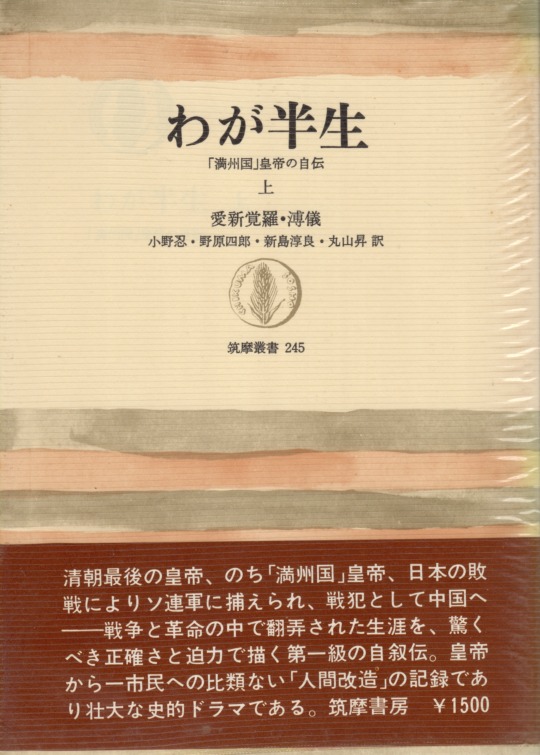
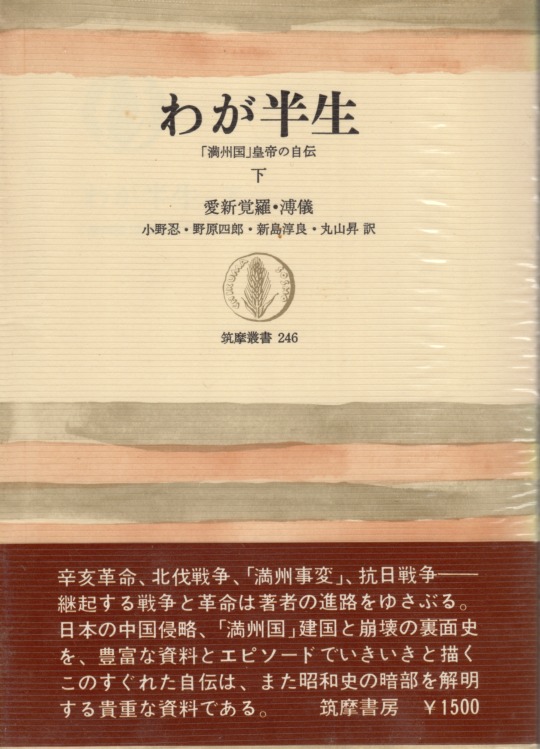
わが半生-「満州国」皇帝の自伝
愛新覚羅・溥儀、小野忍・野原四郎・新島淳良・丸山昇=訳
筑摩叢書 245・246
装幀=原弘(NDC)
#わが半生-「満州国」皇帝の自伝#愛新覚羅溥儀#Aisin-Gioro Puyi#Xuantong Emperor#宣統帝#小野忍#野原四郎#新島淳良#丸山昇#筑摩叢書#原弘#NDC#日本デザインセンター#anamon#古本屋あなもん#あなもん#book cover#満洲#満州
6 notes
·
View notes
Photo

“Throne Will Accede to Rebels,” Winnipeg Tribune. December 27, 1911. Page 1.
----
Chinese Imperial Court and Premier Give Up Fight - Regret Powers Refused Loans For War Purposes
----
Peking, Dec. 27. - Representative members of the imperial court, according to an an authoritative source, have signaled to Premier Yuan Shi Kai their willingness to agree to an abdication. The court, the same authority states, realizes that there is no hope for it in the detention of three or four detached sections of the country and semi-royal provinces, and hopes to obtain better terms by agreeing to the proposed referendum on the form of government.
The premier is certain that he could win several battles with a modern army at his disposal, but as he is unable to obtain any loans he would be unable to reconquer the lost provinces.
Premier to Resign
Yuan Shi Kai in all probability will resign his office after making the best terms possible for the throne. He considers Tang Shao Yi, a deserted, and suggests that the latter might become president of the republic, an office he himself would not accept.
Yuan Shi Kai also regrets that foreign nations have withheld their financial support with which he could have reconquered the country.
#beijing#qing empire#qing china#emperor of china#xinhai revolution#辛亥革命#chinese revolution#qing dynasty#xuantong emperor#溥儀#manchu dynasty#anti-qing politics#end of the qing#yuan shikai#history of china#chinese history
2 notes
·
View notes
Text
1917-Manchu Restoration


Chinese General Zhang Xun seizes control of Beijing and restores the monarchy, installing Puyi, last emperor of the Qing dynasty, to the throne. The restoration is reversed just shy of two weeks later, when Republican troops regain control of the capital.
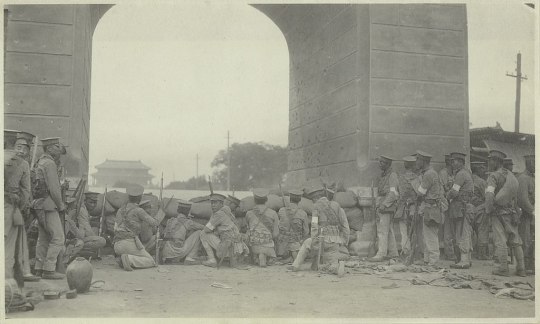


The Manchu Restoration or Dingsi Restoration[2] (Chinese: 丁巳復辟), also known as Zhang Xun Restoration[3] (simplified Chinese: 张勋复辟; traditional Chinese: 張勳復辟), or Xuantong Restoration[4] (simplified Chinese: 宣统复辟; traditional Chinese: 宣統復辟), was an attempt to restore the Chinese monarchy by General Zhang Xun, whose army seized Beijing and briefly reinstalled the last emperor of the Qing dynasty, Puyi, to the throne. The restoration lasted just shy of two weeks, from July 1, 1917 to July 12, 1917,[5] and was quickly reversed by Republican troops. Despite the uprising's popular name ("Manchu Restoration"), almost all putschists were ethnic Han.[1]
0 notes
Text

The Xuantong Emperor (Center with sunglasses) sitting with his siblings.
Sitting from left to right: Princess Yunyu (1919 - 1982), Princess Yunxian (1914 - 2003) , Prince Puren (1918 - 2015), Princess Yunxin (1917 - 1998) and Princess Yunhuan (1921 - 2004).
Standing from left to right: Princess Yunhe (1912 - 2001), Prince Pujie (1907 - 1994) and Princess Yunying (1913 - 1992).
#emperor puyi of china#yunying of the gobulo clan#zhen yunhe#yunxian of the zhao clan#wan yunxin#yunyu of the wanyan clan#qiao yunhuan#prince puren of china#chinese imperial family#chinese history#qing dynasty#house of aisin-gioro#gobulo clan#zhao clan#wanyan clan
18 notes
·
View notes
Photo
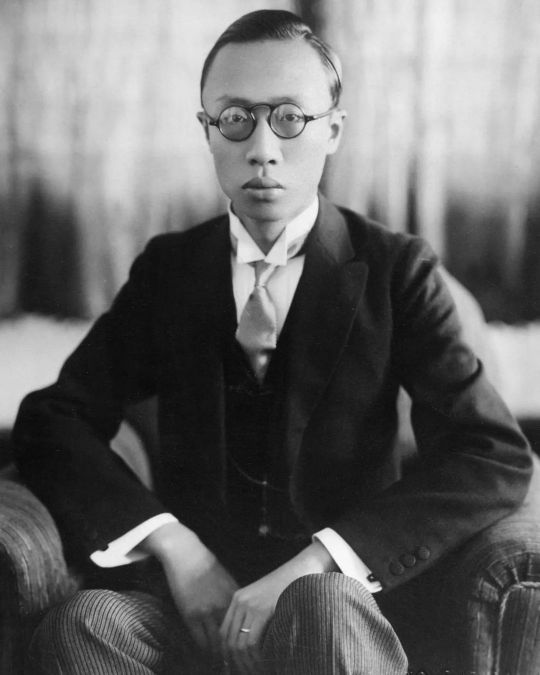
Aisin-Giro Puyi, The Last Emperor of the Qing Dynasty (1906-1967) Born in 1906, Aisin-Gioro Puyi was the last Emperor of the Qing dynasty, ascending the throne as the Xuantong Emperor at nearly three years old in accordance with the Empress Dowager Cixi’s decree. When the Japanese forces surrendered in 1945, Puyi was captured at Shenyang Airport by the Soviet Red Army. After he was detained, Puyi was held first in Chita as a prisoner of war, then incarcerated in a Khabarovsk detention camp for five years. During his time in the Soviet Union, Puyi developed a close friendship with his interpreter, Georgy Permyakov. After Chairman Mao Zedong’s victory in China, he visited the Soviet Union in 1950 and authorities agreed to Puyi’s repatriation. According to a first-hand account by the Emperor’s nephew, it was at this time that Puyi gifted the watch to his friend, the interpreter. In August 1946, Puyi testified at the International Military Tribunal for the Far East as a historical witness. Four years later, in 1950, Puyi was extradited back to China before eventually being granted amnesty several years later and becoming a citizen of New China. He was also appointed Commissioner on Cultural and Historical Materials by the National Committee of the Chinese People’s Political Consultative Conference. On 17 October 1967, Puyi passed away of illness in Beijing at age 61. His life would later be dramatised by Bernardo Bertolucci’s 1987 cinematic masterpiece, The Last Emperor. https://www.instagram.com/p/Cp5zSA1LJgv/?igshid=NGJjMDIxMWI=
2 notes
·
View notes
Text
Events 2.12
1096 – Pope Urban II confirms the foundation of the abbey of La Roë under Robert of Arbrissel as a community of canons regular.
1404 – The Italian professor Galeazzo di Santa Sophie performed the first post-mortem autopsy for the purposes of teaching and demonstration at the Heiligen–Geist Spital in Vienna.
1429 – English forces under Sir John Fastolf defend a supply convoy carrying rations to the army besieging Orléans in the Battle of the Herrings.
1502 – Isabella I issues an edict outlawing Islam in the Crown of Castile, forcing virtually all her Muslim subjects to convert to Christianity.
1502 – Vasco da Gama sets sail with 15 ships and 800 men from Lisbon, Portugal on his second voyage to India.
1541 – Santiago, Chile is founded by Pedro de Valdivia.
1593 – Japanese invasion of Korea: Approximately 3,000 Joseon defenders led by general Kwon Yul successfully repel more than 30,000 Japanese forces in the Siege of Haengju.
1689 – The Convention Parliament declares that the flight to France in 1688 by James II, the last Roman Catholic British monarch, constitutes an abdication.
1733 – Georgia Day: Englishman James Oglethorpe founds Georgia, the 13th colony of the Thirteen Colonies, by settling at Savannah.
1771 – Gustav III becomes the King of Sweden.
1817 – An Argentine/Chilean patriotic army, after crossing the Andes, defeats Spanish troops at the Battle of Chacabuco.
1818 – Bernardo O'Higgins formally approves the Chilean Declaration of Independence near Concepción, Chile.
1825 – The Creek cede the last of their lands in Georgia to the United States government by the Treaty of Indian Springs, and migrate west.
1832 – Ecuador annexes the Galápagos Islands.
1889 – Antonín Dvořák's Jakobín is premiered at National Theater in Prague.
1894 – Anarchist Émile Henry hurls a bomb into the Cafe Terminus in Paris, killing one person and wounding 20.
1909 – The National Association for the Advancement of Colored People (NAACP) is founded.
1909 – New Zealand's worst maritime disaster of the 20th century happens when the SS Penguin, an inter-island ferry, sinks and explodes at the entrance to Wellington Harbour.
1912 – The Xuantong Emperor, the last Emperor of China, abdicates.
1919 – The Second Regional Congress of Peasants, Workers and Insurgents is held by the Makhnovshchina at Huliaipole.
1921 – Bolsheviks launch a revolt in Georgia as a preliminary to the Red Army invasion of Georgia.
1935 – USS Macon, one of the two largest helium-filled airships ever created, crashes into the Pacific Ocean off the coast of California and sinks.
1945 – A devastating tornado outbreak in Mississippi and Alabama kills 45 people and injures 427 others.
1946 – World War II: Operation Deadlight ends after scuttling 121 of 154 captured U-boats.
1946 – African American United States Army veteran Isaac Woodard is severely beaten by a South Carolina police officer to the point where he loses his vision in both eyes. The incident later galvanizes the civil rights movement and partially inspires Orson Welles' film Touch of Evil.
1947 – The largest observed iron meteorite until that time creates an impact crater in Sikhote-Alin, in the Soviet Union.
1947 – Christian Dior unveils a "New Look", helping Paris regain its position as the capital of the fashion world.
0 notes
Text
Wanrong: The Tragic Tale of the Last Empress of China
Wanrong: The Tragic Tale of the Last Empress of China
Wanrong, born on November , 906, was the last Empress of China. She was the wife of Puyi, the last Emperor of China, and is sometimes anachronistically referred to as the “Xuantong Empress,” referring to Puyi’s era name.To get more news about last empress of china, you can visit shine news official website.
Born into the Manchu Plain White Banner Gobulo clan, Wanrong was the daughter of a high-ranking minister in the Imperial Court. Her father was progressive for his time and insisted that she receive an education equal to her brothers. As a result, she was fluent in English and accomplished in piano.
In 9, when Wanrong was only 6 years old, she was presented to Emperor Puyi as a potential bride. Despite the abolition of the monarchy in 9, Puyi was still allowed to live in the Forbidden City. Wanrong’s family, seeing an opportunity, put her forward in a bridal bid.
Wanrong married Puyi in 9 and became the titular Empress consort of the former Qing dynasty until the exile of the imperial family in November 9. She later became the Empress consort of Manchukuo, a Japanese puppet state in northeastern China, from 9 until the abolition of the monarchy in August 95.
However, Wanrong’s life was far from a fairy tale. Her reign as Empress was marked by tragedy and hardship. After the monarchy was abolished, all of Wanrong’s decadent pleasures turned into dust. By the end of her life, Wanrong had lost her crown, her child, and most infamously of all, her sanity.
During the Soviet invasion of Manchuria at the end of the Second Sino-Japanese War in 95, Wanrong was captured by Chinese Communist guerrillas. She was transferred to various locations before she was placed in a prison camp in Yanji, Jilin. She died in prison in June 96, and her remains were never found.
Wanrong’s tragic tale serves as a stark reminder of the tumultuous times that marked the end of imperial rule in China. Her life, filled with opulence, tragedy, and ultimately despair, is a poignant symbol of the end of an era.
1 note
·
View note
Link
0 notes
Text
Germany today is firmly republican. While Germany does not officially recognise any royal and noble titles, all of which were abolished at the beginning of the Weimar Republic (1919–1933), descendants of some of these aristocratic families still wield some influence, most of it benign.
71-year-old Heinrich XIII, Prince of Reuß, whose family ruled parts of eastern Germany for 800 years was involved.
China’s centuries-old monarchy was formally abolished on February 12, 1912, with the abdication of China’s last emperor, Aisin-Gioro Puyi (1906–1967), also known as the Xuantong Emperor. Five years later, however, Puyi was restored to the throne in a 12-day coup that was an early harbinger of the greater chaos that would afflict China in the next few decades.
0 notes
Text
Last Chinese Emperor's Watch Sells for $6.2 Million

An auction house in Hong Kong sold several items on Tuesday that belonged to Aisin-Giyoro Puyi, the last emperor of China, who was dethroned in 1912. The items included a Swiss-made luxury watch, which went for $6.2 million.
The watch was a Patek Philippe Reference 96 Quantieme Lune, one of just eight known to exist. The unknown collector who purchased it did so at nearly twice the price it was expected to net, setting a record for the make of watch and for timepieces previously owned by emperors.
The ultra-rare timepiece was made in Geneva in 1937 and has a Bauhaus-inspired platinum case that houses a silvered dial, with a rose-gold chapter ring and enamel hour markers. It also has an indicator for phases of the moon and a triple-date calendar - features just as rare in 1930s watches as the watch itself.

Twitter: Frederik Balfour@Frederikbalfour! #phillips selling last emperor Puyi’s Patek Philippe May 23 in Hong Kong. One of only 8 made, and 3 known to still exist. Estimate: $3 million. Appeals to watch nerds and history buffs. Puyi’s gifted it to Russian interpreter in 1950 after 5 years internment in Siberia. #watches
"I was delighted because after more than 3 years of hard work on researching, we found all the missing pieces of this beautiful puzzle," said Thomas Perazzi, Phillips’ head of watches for Asia. "This result brings Hong Kong to a new level as really a hub for fine watches and extremely important, collectible timepieces."
It’s not known how Puyi acquired the watch, which he gave to his Russian interpreter, Georgy Permyakov, while in a Soviet prison after World War II. Puyi was arrested by Soviet forces during the final weeks of the war, as the Red Army launched its invasion of Japanese-held territories in China and Korea. Puyi had ignominiously served as the Japanese Empire’s ruler of Manchukuo, the puppet state established in Manchuria after it seized the region from China in 1931.
Puyi was just two years old when he ascended to the Dragon Throne in 1908 at the urging of the late Empress Dowager Cixi, who died days before his crowning as the Xuantong Emperor. Just four years later, Puyi was forced to abdicate the throne by a swelling revolutionary movement, which declared a Republic of China in February 1912, ending 2,132 years of imperial rule. However, he continued to live in the palace complex and was briefly reinstalled as emperor as warring factions vied for power.
In 1932, he successfully courted the Japanese Empire, which allowed him to become its puppet ruler in Manchukuo, taking on the name Kangde. However, he was almost totally a figurehead, signing proclamations issued to him by Tokyo.
Following his arrest by the Soviets in 1945, Puyi was imprisoned and tried for war crimes at the Tokyo Trials, but escaped execution and was instead sentenced to ten years in prison and to be politically reeducated. In 1950, he was extradited to the newly-founded People’s Republic of China, which had succeeded at reuniting all of China except for Taiwan under a socialist republic. He was released in 1959 a deeply changed man, expressing regret for his time as an emperor. Puyi joined the Communist Party of China and even served as a representative in the Chinese People's Political Consultative Conference and the National People's Congress before dying in 1967.
Other items sold at the auction also belonging to Puyi include a manuscript notebook, a leather-bound edition of Confuscius' "Analects," which together sold for $121,634 - almost five times the pre-sale estimate - and an inscribed red paper fan given to Permyakov in Tokyo, which sold for $77,846 - six times the pre-sale estimate.
0 notes
Photo
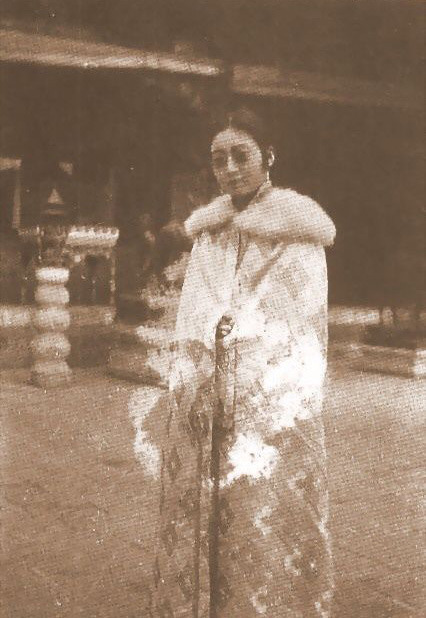
Empress Wanrong of China, also known as Xuantong Empress of the Manchu Plain White Banner Gobulo clan, was the wife and empress consort of Puyi, the last Emperor of China. She was titular Empress consort of the Qing dynasty from 1922 until abolition of the monarchy in 1924.
#Empress Wanrong#China#Empress Wanrong of China#Empress Xiaokemin#Xuantong Empress of the Manchu Plain White Banner Gobulo clan#The Last Empress of China#Xuantong Empress#possibly posing for the camera possibly wearing her husband Puyi's glasses 1922-24#Historical Portraits#Vintage Portraits#Portraits of Women
10 notes
·
View notes
Photo
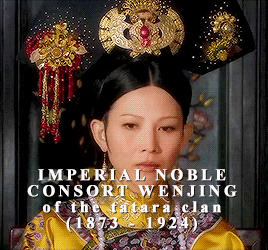
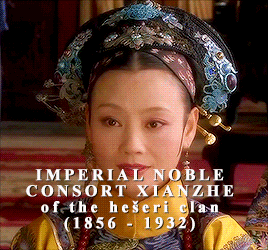

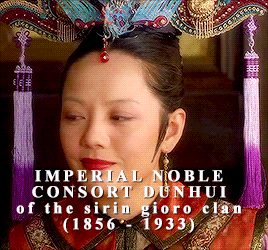
QING DYNASTY APPRECIATION WEEK DAY 3 | The Four Dowager Consorts (四大太妃)
The Four High Dowagers Consorts were the three widows of the Tongzhi Emperor, Imperial Noble Consort Xianzhe, Imperial Noble Consort Dunhui and Imperial Noble Consort Gongsu, and the widow of the Guangxu Emperor, Imperial Noble Consort Wenjing. Imperial Noble Consort Gongsu was the paternal aunt of Empress Xiaozheyi. After the death of Empess Dowager Longyu, they managed to obtain the title of High Consort and Puyi, the Xuantong Emperor, addressed them all as “august mother”. Imperial Noble Consort Wenjing became the head of the High Consorts, at the recommendation of Yuan Shikai, and had more control over Puyi than the other consorts. She was very strict with him, but when Youlan, Puyi’s birth mother, committed suicide by swallowing opium after being publicly reprimanded by Wenjing for her son's misbehaviour, she changed her attitude towards him and became more agreeable. Puyi described his upbringing by the Four Consorts:
“The Empress Dowager Lung Yu died when I was seven years old, so that I actually lived longer with the remaining four High Consorts. I saw them very infrequently, however, and I never sat with them or talked with them in a family way. Each morning I would go to them to pay my respects. At this time of day the consorts were having their hair dressed and, while this was being done, they would ask: “Did the Emperor sleep well? How far have you read in your book?” It was always the same banal talk. Sometimes they would give me clay toys to play with, but they never failed to end the audience with the same final phrase: “Emperor, please go out now and play.” This would be the end of the meeting and we would never see one another again for the whole day.”
Source: Henry Pu Yi. The Last Manchu: The Autobiography of Henry Pu Yi, Last Emperor of China
#my gifs#historyedit#history#women in history#qingdynastyappreciationweek#qing dynasty#*mine#imperial noble consort wenjing#imperial noble consort xianzhe#imperial noble consort dunhui#imperial noble consort gongsu#not entirely satisfied with this but anyways
104 notes
·
View notes
Photo
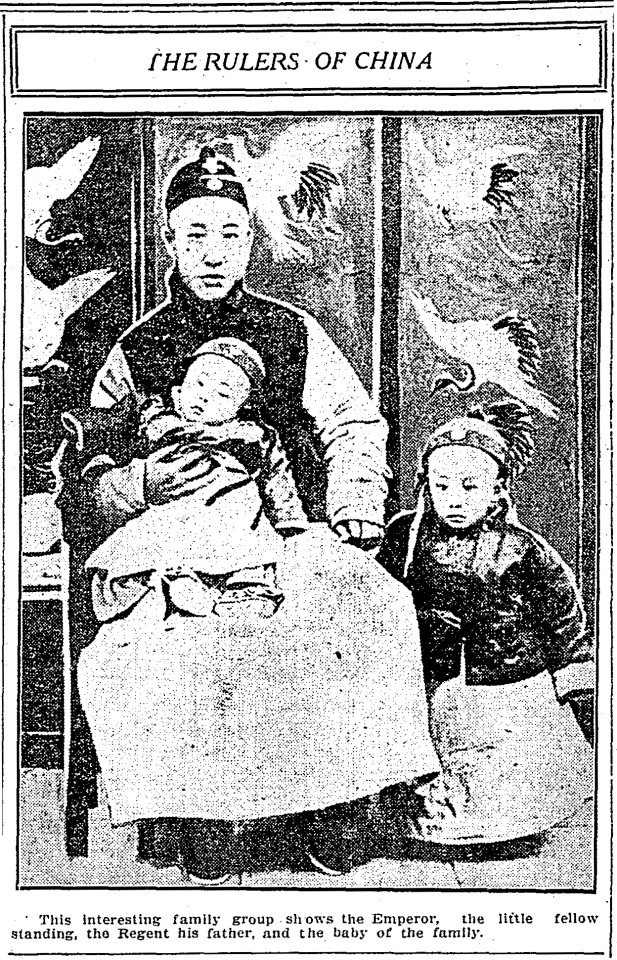
“The Rulers of China,” Toronto Star. October 13, 1911. Page 1.
----
This interesting family group shows the Emperor, the little fellow standing, the Regent his father, and the baby of the family.
#qing empire#qing china#emperor of china#puyi#xuantong emperor#溥儀#xinhai revolution#辛亥革命#manchu dynasty#chinese revolution#qing dynasty#zaifeng#prince chun#regent#chinese history#history of china
11 notes
·
View notes
Photo

“I love the story of Emperor Puyi visiting the Forbidden City in his last years. His wife wrote in memoir that she wondered how he (kicked out at age of 18) felt, having to buy a ticket to enter his former home after so many years. She recorded 2 anecdotes which I found sad & interesting at the same time 1) they were shown a room where the tour guide said it’s “the room where Xuantong Emperor (Puyi) studied” & how Puyi just looked at his wife, amused and no one around even recognised the very same emperor was standing there. 2) They visited Guangxu Emperor’s living area & Puyi found that the photo they put wasn’t of Guangxu but his own father Prince Chun’s and the staff didn’t agree with him lol.” - Submitted by Anonymous
70 notes
·
View notes
Text

Zaifeng, Prince Chun of the First Rank with his eldest son The Xuantong Emperor (Puyi)
#zaifeng prince chun of the first rank#emperor puyi of china#chinese imperial family#chinese history#qing dynasty#house of aisin-gioro
3 notes
·
View notes
Text
Rise of Sixteen States: 290 - 299
(The Migriation Crisis of 298. Also ended up including some bits from the HYGZ that are not too relevant to the rest of the stuff.)
290 – 291
(Liu Yuan)
Yang Jun assisted the government. He used Liu Yuan as General who Establishes Power and Great Chief Controller of the Five Sections, ennobled as Marquis of Hanguang district.
294
(Murong Hui)
Hui, since Dajicheng was precisely the hill of Emperor Zhuanxu, in the 4th Year of Yuankang [294 AD] therefore moved to reside there. He taught to mulberry farm, and his laws and regulations were similar to the superior states.
295
(Fu Hong)
Aged twelve, Fu Hong's father passed on, and he replaced him as leader of the section. He excelled at studying with many adaptive plans, and he was good at riding and shooting.
296
(Li Te)
Li Te's father Mu was Hunting Commander of the Eastern Qiang. Te and his brothers were five: The oldest brother was Fu, courtesy name Xuanzheng. The next was Te (courtesy name Xuanxiu). Te's younger brother was Xiang, courtesy name Xuanxu. Xiang's younger brother was Liu, courtesy name Xuantong. Liu's younger brother was Xiang#, courtesy name Xuanlong. All were sharp and gallant, and had martial capability.
Te as young served the province and commandery, and was seen as unusual in his times. He was eight chi tall, was valiant, martial, and good at riding and shooting. He was deeply resolute and had great measures.
(HYGZ: 6th Year of Yuankang [296 AD], again considered Liang# and Yi provinces to be weighty provinces. Moved the Inspector of Yi province, Li# ??? to have Liang# province, concurrently General of Talented Officials. The General who Spreads Fervent, Zhao Xin, concurrently General of Smashing Charges.)
Middle of Yuankang [291 – 299], Qi Wannian of the Di rebelled, West of the Passes were disturbed and in chaos. Tianshui, Lüeyang, Fufeng, and Shiping commanderies were all robbed by troops.
(HYGZ: The Di of Guanzhong and the Qiang of Malan rebelled. They robbed Tianshui, Lüeyang, Fufeng, Shiping, Wudu, and Yinping. Issued out the [Inspector of] Liang# province and the [Colonel of] the Eastern Qiang and the [General] who Garrisons the West to chastise them. They did not overcome. Yi province dispatched Ma Xuan and Yin Fangjiu of the Serrated Gates to assist them. They used deer carts to transport grain from Chengdu to provide army provisions.)
(Yang clan)
The Yang clan of the Di of Qingshui in Lüeyang from Qin, Han and onwards, had for generations lived in Longyou, and been a prominent family. In the middle of Emperor Xian of Han's Jian'an [196 – 220] there was Yang Teng, he was a great leader of the section family groups.
Teng's son Ju was brave, strong and with many plans and schemes. He was the first to move to Chouchi. The land of Chouchi has an area of 100 [bai] qing, because of that he used Baiqing as the title. On four sides it was steep and sheer. The lofty flat land [?] has an area of more than 20 li. The road coils like goat intestines for thirty-six rotations. On top of the mountain is the source of the Feng river. Cook the earth to achieve salt.
Ju's descendant had the name Qianwan. Wei ennobled him as King of the Baiqing Di. Qianwan's son [or?] grandson was named Feilong. They gradually became vigorous and abundant. Wu of Jin made use of him as General who Conquers the West. He returned to live in Lüeyang. He had no sons, he raised his sister's child of the Linghu clan as his son. He was named Wusou. [In WS he named Maosou.]
In Emperor Hui of Jin's 6th Year of Yuankang [296 AD], to escape the chaos of Qi Wannian, he led 4 000 families of the section group to turn back and guard Baiqing. He titled himself General who Assists the State and Worthy King of the Right. Many of those people and gentlemen of Guanzhong who ran in flight relied on him. Wusou invited and admitted, consoled and connected. If they wished to leave he then guarded, protected, supplied and dispatched them.
298
(Li Te)
Among the Di there were in one year after the other great famine, the hundred families drifted and moved to go looking for grain. Those who joined each other to enter Hanchuan [I. e. Hanzhong] were several ten thousand families. Li Te followed along the drifting people about to enter Shu. When they arrived at Jiangge, he sat down legs sprawling with a great breath, looked up at the narrow defile, and said:
Liu Shan had land like this, yet he faced bound up to [other] people. How was he not of mediocre talent!
Those who were migrating together with him, Yan Shi, Zhao Su, Li Yuan, Ren Hui, and others all sighed in amazement.
Earlier, when the drifting people had arrived in Hanzhong, they sent up a letter seeking to depend on the food in Ba and Shu. The court discussed and did not allow it. They dispatched the Attendant Steering Clerk Li Bi to Hold the Tally and comfort and reassure them, and moreover to oversee and examine them, and not make them enter Jiange. When Bi arrived in Hanzhong, he accepts goods and gifts from the drifting people. He turned around and made a petition which said:
The drifting people are more than 100 000 mouths, not something Hanzhong, a single commandery, is able to raise support for. Down east into Jing province, the river current is swift and dangerous, and also they have no boats or ships. Shu has granaries and storehouses, and the people repeatedly have abundant harvests. [We] ought to make them go there for food.
The imperial court followed him, and so they scattered to be in Yi and Liang#, and could not be forbidden or halted.
(HYGZ: 8th Year [of Yuankang], Zhao Xin arrived in province. Though he honoured the simple and restrained, by nature he was really extravagant and haughty.
A commoner of the six commanderies of Lüeyang and Tianshui, Li Te, his younger brother Xiang, Yan Shi, Zhao Su, He Ju, Li Yuan, and others and several ten thousand families of the Di Sou and the Blue-green Sou, since their sundry lands for continuous years had been laid waste by the armies, went [looking] for grain and enter Hanchuan. A decree written that they were not allowed to enter Shu.
Yi province directed the passes to forbid them, but the Board of Household [official] Li Bi opened the passes and set them free to enter Shu. They dispersed and spread out in Liang# province and the regions of the Three Shu.
Huang Shi from Xingle county in Minshan, Cheng Tunjian, An Jiao, Cheng Mingshi of the Lushui Hu of Beidi and others, were enemies of with the Wenjiangliu [?] and Zili Qiang of Guangrou and Pingkang Thereupon they together with Zhi Feng of the Bangtong Qiang [?] and others with several thousand cavalry threatened the county prefect, and sought aid to chastise the Zili. The Grand Warden, Yang Binta, killed Tunian, and took the surrender of his remaining kin. The remaining kin thereupon thereupon rebelled, and killed the senior functionaries.
Winter, the Colonel of the Western Yi, Qu Bing of Xiping, petitioned to set out with the army. He dispatched the Commander of the Serrated Gates, Sun Tiao, as Controller-Protector, and lead ten thousand people to campaign against them. They fought at Chang'an常安 and greatly were routed by the Hu.)
299
(HYGZ: 9th Year [of Yuankang], Qu Bing, due to the defeat of his army, was summoned to return.
Summer, employed the Grand Warden of Jiangxia, Cheng Zong, as his replacement. The Hu withdrew and dispersed.)
Yuankang era (291 – 299)
(Liu Yuan)
At the end of Yuankang [291 – 299], Liu Yuan was charged with the section population rebelling and setting out from the frontier, and was dismissed from office.
(JS004 records a rebellion by the Xiongnu leader Haosan in 294, and his brother Duyuan in 296. Yuan's dismissal could have been related to this. Duyuan's followers included Malan Qiang, and the Malan Qiang later the same year also joined Qi Wannian. There could well have been Xiongnu among Wannian's followers as well.)
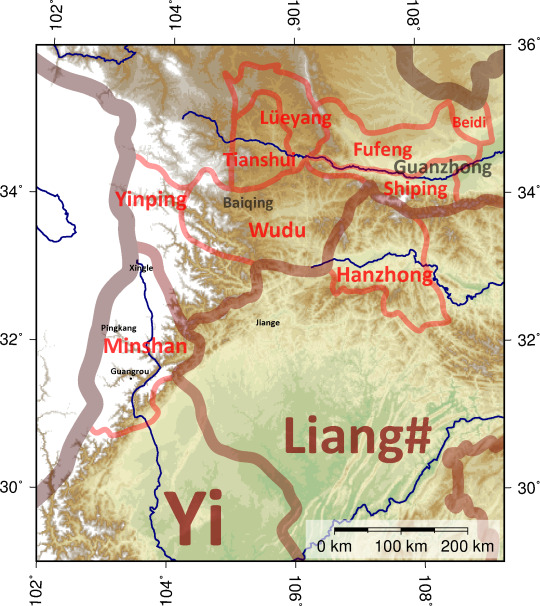
5 notes
·
View notes